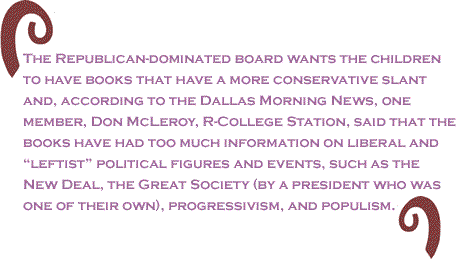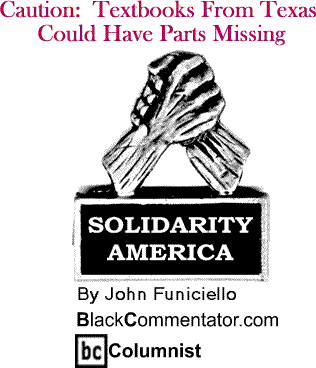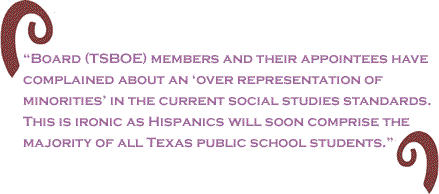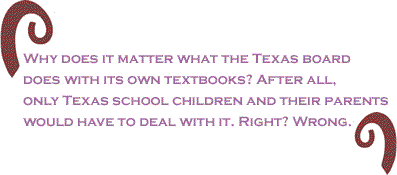
|
||||||||||||||||||||||
|
||||
 |
||||
It�s hard to say that �only in Texas could this happen,� but it�s hard to imagine that in any other state they�d want to remove references to Cesar Chavez, co-founder of the United Farm Workers (UFW) union, from their textbooks. But that�s what the Texas State Board of Education (TSBOE) is contemplating�that and the removal of other persons they consider to have had too long a run in the social studies and history textbooks of the nation. Because Chavez was for three decades one of the most recognizable labor leaders in America, the UFW is concerned that the TSBOE just might decide to remove his name and face from their textbooks and a number of other Hispanics and minorities, as well. Why does it matter what the Texas board does with its own textbooks?� After all, only Texas school children and their parents would have to deal with it.� Right?� Wrong.
Not only was the late Cesar Chavez a union leader, but he was recognized by friends and enemies as a civil rights leader. Yet, according to the UFW in a recent call for support to urge the TSBOE to curb its impulse to reduce minority representation in textbooks, �Board (TSBOE) members and their appointees have complained about an �over representation of minorities� in the current social studies standards. This is ironic as Hispanics will soon comprise the majority of all Texas public school students.� The union, which has been following this issue closely, said that an education expert (a Texan, it�s to be assumed) told the new head of the board, Gail Lowe, that Chavez ��lacks the stature�and contributions� and should not be �held up to our children as someone worthy of emulation�� Others could lose their place in history, the UFW has warned, including Irma Rangel, the first Hispanic woman elected to the state legislature.� The list of historical figures to be revised or excised, however, is long and it is not certain that all traces of them will be removed from the books. The TSBOE only sets standards for textbooks about once in a decade, so the current deliberations are rather rare and the board is not expected to make final decisions until sometime in the spring.
The Republican-dominated board wants the children to have books that have a more conservative slant and, according to the Dallas Morning News, one member, Don McLeroy, R-College Station, said that the books have had too much information on liberal and �leftist� political figures and events, such as the New Deal, the Great Society (by a president who was one of their own), progressivism, and populism. As a result, textbooks will not be required to contain information about organizations such as the Mexican American Legal Defense Fund, Supreme Court Justice Sonia Sotomayor, or the late Senator Ted Kennedy, D-Mass.
The conservative wing of the TSBOE has not achieved all it set out to do, since its attempt to require textbooks publishers to include religious revivals as influential in moving the nation toward the American Revolution. In its deliberations, the board is mulling over such topics as evolution and the seemingly ever-changing list of who�s in and who�s out.� Hispanic leaders want more of their numbers included, noting that only 16 of the 162 figures in the draft curriculum were Hispanic. The discussions will continue among board members, through their meeting in March, with their final decision to come with a vote the May meeting. Unlike most states, where the local districts select the textbooks, in Texas the state board does the picking and, since it is the second largest state in number of students, the publishers pay very close attention to what the Texans want.� The textbook contracts are very lucrative. In effect, the Texas board has a veto over what they might find objectionable, even if other states want much more included in their books.� In the end, the other states are stuck with what Texas decides for their children and for all children. The board is reported to have wanted Texas schools and books to concentrate on the post-Civil War period as a time of progress of freed black Americans (Lincoln was a Republican), while ignoring civil rights movements, especially the civil rights movement in the 1950s and 1960s that resulted in real progress (a time of Democratic national politics).
The state board has great power in the selection of the contents of the books that children around the country will read and study.� The board manages the $22 billion school fund that supports the public schools in Texas, so the people have given the 15 members a great responsibility. Politicizing the process of writing textbooks is a sure way to miseducate the children.� Turning the children into spouters of claptrap�such as that evolution is �hooey,� as one board member reportedly asserted�will set them back in their educations, possibly for a lifetime.� That does them a disservice, personally, but it also does a disservice to the nation. Every parent, from Maine to New Mexico, should be aware of what the Texas State Board of Education is doing to its textbooks, because they mold the minds of your children as well as theirs. BlackCommentator.com
Columnist, John Funiciello, is a labor organizer and former union
organizer. His union work started when he became a local president
of The Newspaper Guild in the early 1970s. He was a reporter for
14 years for newspapers in |
||||
 |
||||
If you would like to comment on this article, please do so below. There is a 400 character limit. You do not need a FaceBook account. Your comment will be posted here on BC instantly. Thanks. Entering your email address is not mandatory. You may also choose to enter only your first name and your location.
|
||||
Thank you very much for your readership. |
||||
| Any BlackCommentator.com article may be re-printed so long as it is re-printed in its entirety and full credit given to the author and www.BlackCommentator.com. If the re-print is on the Internet we additionally request a link back to the original piece on our Website. | ||||
| |
||||
Issue 359 |
| Executive Editor: Bill Fletcher, Jr. |
| Managing Editor: Nancy Littlefield |
| Publisher: Peter Gamble |
| Est. April 5, 2002 |
| Printer Friendly Version in resizeable plain text format |
 |
 |
 |

|
 |
| |
| |












































